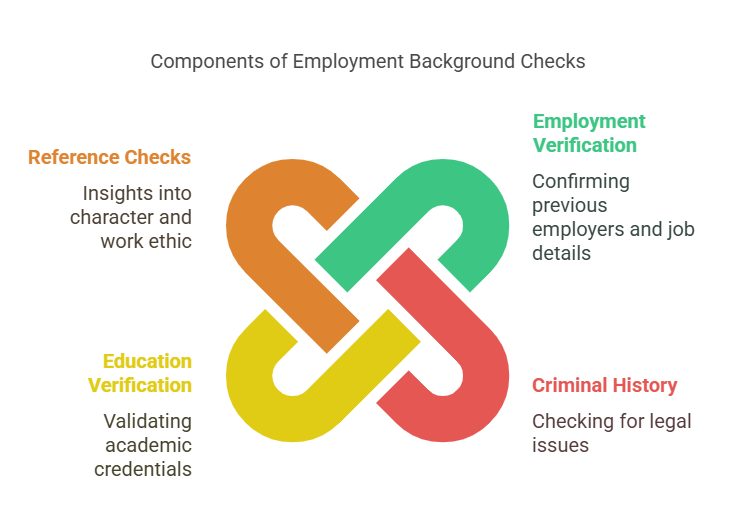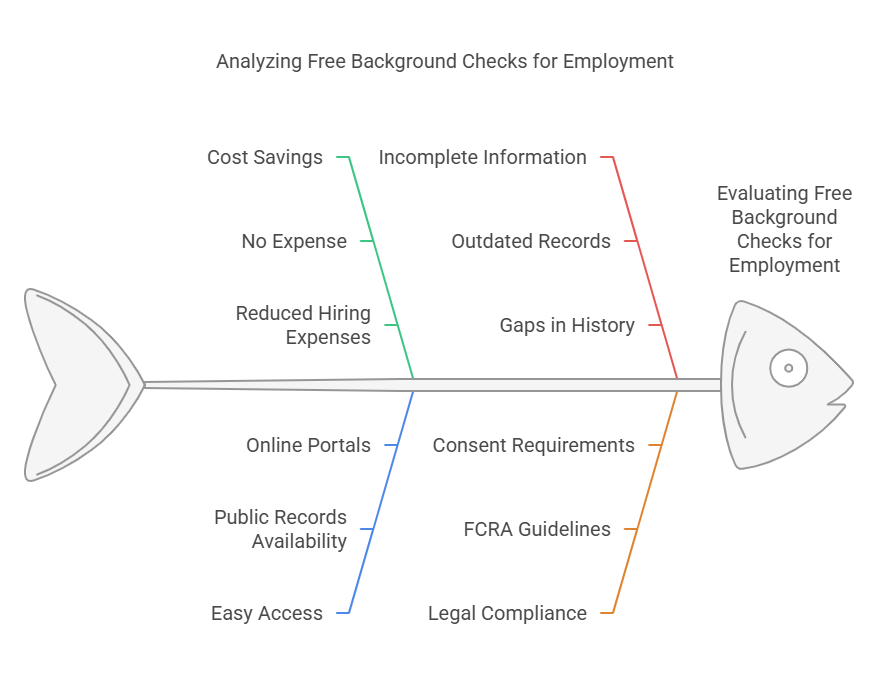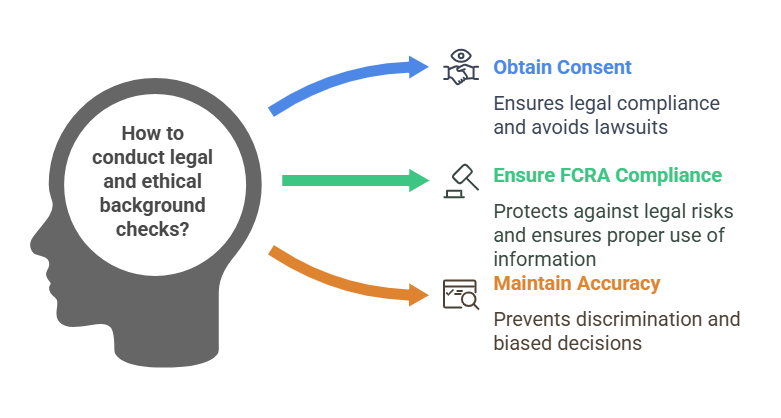How to Conduct a Free Background Check for Employment

Introduction and Understanding Free Background Checks
Introduction
Background checks play a critical role in the hiring process, allowing employers to verify a candidate’s credentials and evaluate their suitability for a job. These checks often include reviewing employment history, educational qualifications, criminal records, and references.
With the growing interest in reducing hiring costs, many job seekers and employers are looking for free background check options. While these options can be appealing, it’s essential to understand their benefits and limitations, especially in comparison to paid services. This article explores the concept of free background checks for employment, how they work, and when they are appropriate.
What Are Background Checks for Employment?

Employment background checks are investigations conducted to verify an individual’s personal, professional, and criminal history. Their primary purpose is to ensure that candidates are truthful about their qualifications and pose no risks to the workplace.
Key Components of Employment Background Checks:
- Employment Verification: Confirming previous employers, job titles, and employment dates.
- Criminal History: Checking for convictions, arrests, or pending legal issues.
- Education Verification: Validating academic credentials, including degrees and certifications.
- Reference Checks: Contacting former colleagues or supervisors for insights into the candidate’s character and work ethic.
These checks help employers make informed hiring decisions, ensuring workplace safety and productivity.
Free Background Checks vs. Paid Background Checks
While free background checks are an attractive option for cost-conscious individuals and small businesses, they differ significantly from paid professional services.
| Aspect | Free Background Checks | Paid Background Checks |
|---|---|---|
| Scope | Limited to publicly available data | Comprehensive and includes private databases |
| Accuracy | Information may be outdated or incomplete | Verified and up-to-date |
| Legal Compliance | May lack adherence to laws like the FCRA | Fully compliant with federal and state regulations |
| Timeliness | Often time-consuming due to manual searches | Quick turnaround times with automated systems |
| Confidentiality | Limited safeguards for sensitive data | Secure handling of personal information |
While free options may suffice for basic checks, they are less reliable for critical hiring decisions where accuracy and compliance are paramount.
How to Find Free Background Checks
Free background checks rely on publicly available information and online tools. Here are some common methods:
- Public Record Searches:
Access court records, property records, and government databases for criminal history, lawsuits, or bankruptcy information. Many states offer free online portals for such searches. - Social Media and Online Presence Checks:
Review a candidate’s social media profiles or conduct Google searches to gather publicly shared information about their professional and personal activities. - Free Trials from Background Check Services:
Some companies offer free trials of their background screening services. These trials may provide limited access to basic records, giving employers a cost-free way to explore their offerings.
Free Resources for Background Check Information
| Resource | Type of Information Provided | Website/Access |
|---|---|---|
| Local Court Websites | Criminal records, case details | Varies by state/county |
| State Department of Corrections | Inmate records, parole/probation status | Varies by state |
| Social Media Platforms | Public posts, professional connections | LinkedIn, Facebook, Twitter |
| Free Trial Background Check Services | Limited criminal or identity checks | Check official websites for offers |
| Google Search | General online presence, news articles | www.google.com |
While these methods can be helpful, they often lack the depth and accuracy needed for comprehensive employment screening.
Why Accuracy Matters in Free Background Checks
Accuracy is crucial in background checks, especially when used for employment purposes. Inaccurate or incomplete information can lead to:
- Hiring unqualified candidates.
- Exposing the workplace to potential risks.
- Facing legal repercussions for non-compliance with laws like the FCRA.
Free background checks should be approached cautiously, and employers must verify the information obtained through reliable sources.
The Pros and Cons of Free Background Checks for Employment

Advantages of Free Background Checks
While free background checks have their limitations, they can offer some valuable benefits in specific situations. Below are the primary advantages of utilizing free background check methods for employment purposes.
1. Cost Savings
The most obvious advantage of free background checks is the lack of expense. For individuals or small businesses with limited resources, avoiding the cost of professional background check services can significantly reduce hiring expenses. This is especially useful if you’re only conducting basic checks or if you’re hiring for non-sensitive positions where a full check may not be necessary.
2. Easy Access
Public records, such as court records and government databases, are typically free and easy to access. Many states and local governments have online portals that allow you to search criminal records, lawsuits, and other publicly available data at no cost. Additionally, social media profiles and online presence can be checked quickly and easily through common search engines.
3. Preliminary Screening
Free background checks can serve as a preliminary screening tool. They are helpful for quickly filtering out candidates with red flags (e.g., a history of serious criminal behavior) before investing time and resources into more thorough investigations. For example, employers can use public records searches to look for major criminal convictions or significant legal issues.
Limitations of Free Background Checks
Despite their benefits, free background checks have several significant drawbacks, which may make them unreliable for crucial employment decisions.
1. Incomplete or Outdated Information
Public records and free search tools often offer incomplete or outdated information. For example, criminal records may not be up to date, missing important recent charges or convictions. Similarly, employment or education histories may not be fully captured, leaving gaps in the candidate’s background. This incomplete information can lead to a false impression of a candidate’s qualifications or history.
2. Lack of Legal Compliance
Free background check tools may not adhere to legal standards such as those outlined in the Fair Credit Reporting Act (FCRA). Employers must follow strict guidelines when conducting background checks for employment purposes. For example, candidates must be notified and provide consent before their background is checked, and they must be given a chance to dispute any adverse results. Many free tools do not ensure compliance with these laws, which could lead to legal issues or lawsuits.
3. Limited Scope of Information
Free background checks are typically limited to public data, which means they may not uncover essential information such as detailed criminal records from private databases, comprehensive employment history, or in-depth reference checks. This limited scope may leave out key details that could be relevant for making an informed hiring decision.
4. Time Consuming
Gathering information from free sources often requires manually searching multiple databases, which can be time-consuming and inefficient. Public records may not be consolidated in one place, and it can take a lot of effort to track down all the necessary details. This may result in delays in the hiring process, which can be frustrating for employers seeking to fill positions quickly.
When to Use Professional Services for Background Checks
In certain situations, the use of professional background check services becomes essential, especially when thoroughness, legal compliance, and timeliness are critical. Here are examples of when employers should consider using paid background check services:
1. Hiring for Sensitive Positions
For positions that involve significant responsibility, such as roles in finance, healthcare, or security, it’s essential to perform thorough background checks. Free tools simply cannot provide the level of detail necessary for screening candidates in these sensitive fields. Paid services can verify employment, criminal history, credit reports, and more to ensure a candidate is qualified and trustworthy.
2. Legal Compliance
Employers are required to comply with legal standards such as the FCRA, which mandates that background checks be conducted with written consent from the applicant, and the applicant be notified if adverse action is taken based on the results. Professional background check services are well-versed in these regulations and ensure that employers remain compliant with local, state, and federal laws.
3. Accurate and Timely Results
Paid services can provide more accurate, up-to-date information and a faster turnaround time than free methods. These services use access to private databases, verified sources, and automated systems that provide more comprehensive checks in a fraction of the time it would take to manually search public records.
The Benefits of Using Exact Background Checks
When reliability, accuracy, and compliance matter most, Exact Background Checks offers the best solution. As a trusted provider of professional screening services, we specialize in delivering thorough and legally compliant background checks.
Key Benefits of Exact Background Checks:
- Accuracy and Reliability: We provide verified and up-to-date information, ensuring you make informed hiring decisions.
- Comprehensive Reports: Our services include a full spectrum of background checks, including criminal history, employment verification, and education validation.
- Compliance: Exact Background Checks adheres to FCRA guidelines and all relevant local, state, and federal laws, safeguarding you from legal risks.
- Fast Turnaround: We deliver results quickly, allowing you to make prompt hiring decisions and avoid delays in the recruitment process.
Tips for Conducting Your Own Free Background Check
If you decide to conduct your own free background check, here are some practical tips to help you stay legal and ethical:
- Start with Public Records: Search online databases provided by your state or local government to find criminal records, court cases, or civil judgments.
- Check Social Media: Review public posts, LinkedIn profiles, and other social media platforms to gain insights into the candidate’s character and behavior.
- Ensure Consent: If you’re conducting any sort of background check for employment purposes, always get the candidate’s consent in writing. Failing to do so may result in legal consequences.
- Verify Accuracy: Double-check information, especially if it seems outdated or incomplete. Public records may not always reflect the most current information.
- Use Multiple Sources: To ensure thoroughness, cross-reference the information you find across different sources, such as social media, public records, and other available databases.
While these steps may help you gather some basic information, remember that professional services offer a more comprehensive and reliable approach.





Great article! Free background checks can be helpful for basic info, but they often lack accuracy and legal compliance.